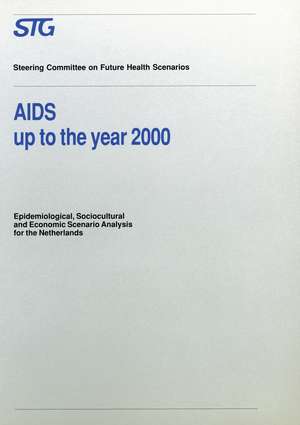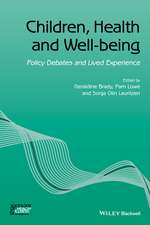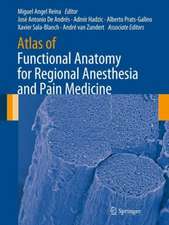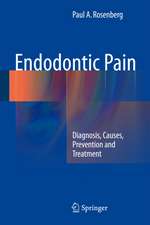AIDS up to the Year 2000: Epidemiological, Sociocultural and Economic Scenario Analysis, Scenario Report Commissioned by the Steering Committee on Future Health Scenarios: Future Health Scenarios
Autor Scenario Committee on AIDS, E.J. Ruitenberg, F.M.L.G. van den Boom, J.C. de Jager, D.P. Reinkind, M.J. Postma, C.E.S. Albersen Limba Engleză Paperback – 30 iun 1992
What proportions will the HIV/AIDS epidemic assume and how many new HIV infections can be averted by HIV/AIDS prevention campaigns? How much care and support will people with HIV and AIDS need and what successes can be expected within the care sector? What will be the social consequences of AIDS and how can ostracism and the social isolation of people with HIV and AIDS be avoided?
These and other related questions form the subject of this book, which examines the sociocultural and economic impact of AIDS in the Netherlands up to the year 2000. The book presents a study carried out by the Netherlands Institute of Mental Health (NcGv) and the National Institute of Public Health and Environmental Protection (RIVM), under the direction of the STG Scenario Committee on AIDS.
The researchers look back at the epidemiological, sociocultural and economic impact of AIDS in the Netherlands during the first decade of the epidemic and, on the basis of this, use scenario analysis to project the impact of AIDS up to the year 2000.
The future projections relate both to the impact of AIDS and the maximization of efforts to combat the disease. In addition to a scenario exploring the impact of AIDS if developments continue unchanged, alternative scenarios are also put forward. These focus on the impact of significant changes in such diverse fields as sexual behaviour, injecting drug use, the effectiveness and organization of HIV/AIDS prevention programmes, and the demand for delivery of care.
The book concludes that the impact of AIDS will only become fully apparent in the second decade of the epidemic. The authors consider the implications of this conclusion for HIV/AIDS prevention programmes, research, care and the efforts to counter the socially undesirable impacts of AIDS.
Din seria Future Health Scenarios
- 5%
 Preț: 1405.13 lei
Preț: 1405.13 lei - 5%
 Preț: 1406.58 lei
Preț: 1406.58 lei - 5%
 Preț: 1410.80 lei
Preț: 1410.80 lei - 18%
 Preț: 948.16 lei
Preț: 948.16 lei - 5%
 Preț: 369.84 lei
Preț: 369.84 lei - 5%
 Preț: 1413.93 lei
Preț: 1413.93 lei - 5%
 Preț: 1408.80 lei
Preț: 1408.80 lei - 5%
 Preț: 1414.29 lei
Preț: 1414.29 lei - 5%
 Preț: 1087.31 lei
Preț: 1087.31 lei - 5%
 Preț: 1085.29 lei
Preț: 1085.29 lei - 5%
 Preț: 1088.24 lei
Preț: 1088.24 lei - 5%
 Preț: 1081.26 lei
Preț: 1081.26 lei - 5%
 Preț: 717.73 lei
Preț: 717.73 lei - 5%
 Preț: 1084.93 lei
Preț: 1084.93 lei - 5%
 Preț: 1413.16 lei
Preț: 1413.16 lei - 5%
 Preț: 1415.01 lei
Preț: 1415.01 lei - 5%
 Preț: 711.15 lei
Preț: 711.15 lei - 5%
 Preț: 723.93 lei
Preț: 723.93 lei - 5%
 Preț: 376.06 lei
Preț: 376.06 lei - 28%
 Preț: 426.87 lei
Preț: 426.87 lei
Preț: 350.56 lei
Preț vechi: 369.01 lei
-5% Nou
Puncte Express: 526
Preț estimativ în valută:
67.08€ • 70.29$ • 55.45£
67.08€ • 70.29$ • 55.45£
Carte tipărită la comandă
Livrare economică 07-14 aprilie
Preluare comenzi: 021 569.72.76
Specificații
ISBN-13: 9780792318958
ISBN-10: 0792318951
Pagini: 314
Ilustrații: XXVII, 314 p.
Dimensiuni: 152 x 223 x 19 mm
Ediția:Softcover reprint of the original 1st ed. 1992
Editura: SPRINGER NETHERLANDS
Colecția Springer
Seria Future Health Scenarios
Locul publicării:Dordrecht, Netherlands
ISBN-10: 0792318951
Pagini: 314
Ilustrații: XXVII, 314 p.
Dimensiuni: 152 x 223 x 19 mm
Ediția:Softcover reprint of the original 1st ed. 1992
Editura: SPRINGER NETHERLANDS
Colecția Springer
Seria Future Health Scenarios
Locul publicării:Dordrecht, Netherlands
Public țintă
ResearchCuprins
I Scenario project AIDS.- 1 Scenario project “The sociocultural and economic impact of AIDS: design and working plan”.- 2 Scenario construction.- II Baseline analyses.- 3 Baseline analysis DIV / AIDS in the Netherlands: 1982-1991.- 4 Baseline analysis of sociocultural aspects of AIDS: 1982-1991.- 5 Baseline analysis of the economic impact of HIV/AIDS 1982-1991.- III Scenario analyses.- 6 Reference scenario: Impact of AIDS in 1995 and 2000.- 7 Risk behaviour and the spread of HIV.- 8 Health care and medical technology.- 9 The response to AIDS: strategies for AIDS control and care.- Concluding remarks.- Appendices.- I List of abbreviations.- II Experts consulted.











